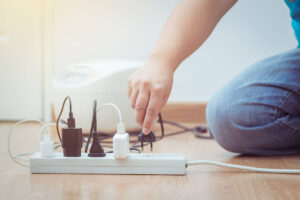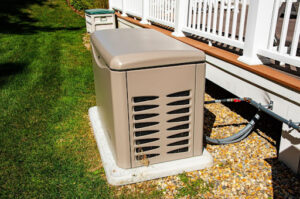
What to Do After Your House Is Struck by Lightning
Lightning strikes can be a terrifying experience for any homeowner. The powerful boom and bright flash are unmistakable, leaving you to wonder about the safety
This week we are focusing on electrical maintenance in your Houston home. Ensuring that your household is safe from electrical hazards should be a priority. While electrical outlet maintenance is essential, your home must also have the latest technology in order to combat a variety of harmful situations. Making sure that your home is outfitted with electrical circuit interrupters is another way to keep your family and home safe. There are two kinds of circuit interrupters, both of which provide different safety functions.
A GFCI (ground-fault circuit interrupter) helps to prevent electric shock and electrocution by disconnecting power when a current is detected flowing through an unintended path (such as water or a person). An AFCI (arc-fault circuit-interrupter) protects against high power discharges of electricity (arc faults) that can result in electrical fires. Both AFCIs and GFCIs co-exist with each other in your home as they both provide different important functions. Understanding the basics of each device will help you better plan an installation strategy with your electrician.
GFCI Essentials:
Also called a ground fault interrupter (GFI) or residual current device (RCD), this device mainly protects your household from the effects of electric shock. There are two types available for permanent installation; a circuit breaker type is installed directly into your electrical panel and a receptacle type that is installed in an electrical outlet. A professional electrician can assess your needs and recommend the best type for your home.
AFCI Essentials:
An arc fault is an unintended arc formed by current flowing through an alternate (or unplanned) pathway. The result is intense heating that can spark small particles of molten or burning materials; igniting the surrounding area and causing a fire. An AFCI breaker essentially monitors the circuit for the presence of normal or dangerous arcing. Dangerous arcing can happen through a lightning strike, a tree falling on a power line or other unforeseen circumstances.
While the NEC requires both types of circuit interrupters for all new construction, older homes need to be retrofitted with them as well. Do you live in a home with an outdated electrical system? You might need more protection than circuit interrupter installation. Call Universal Home Experts today at (713) 364-0226 to schedule a full electrical inspection. We can help you get your home code-compliant – or, if your older wiring system is fine, we can help with the installation of circuit interrupters.

Lightning strikes can be a terrifying experience for any homeowner. The powerful boom and bright flash are unmistakable, leaving you to wonder about the safety

It’s easy to overlook the silent threats that lurk within the walls of your own home — especially when it comes to the electrical system.

In today’s world, where unpredictability seems to be the only constant, ensuring the reliability and safety of our homes has become paramount. Whether it’s due